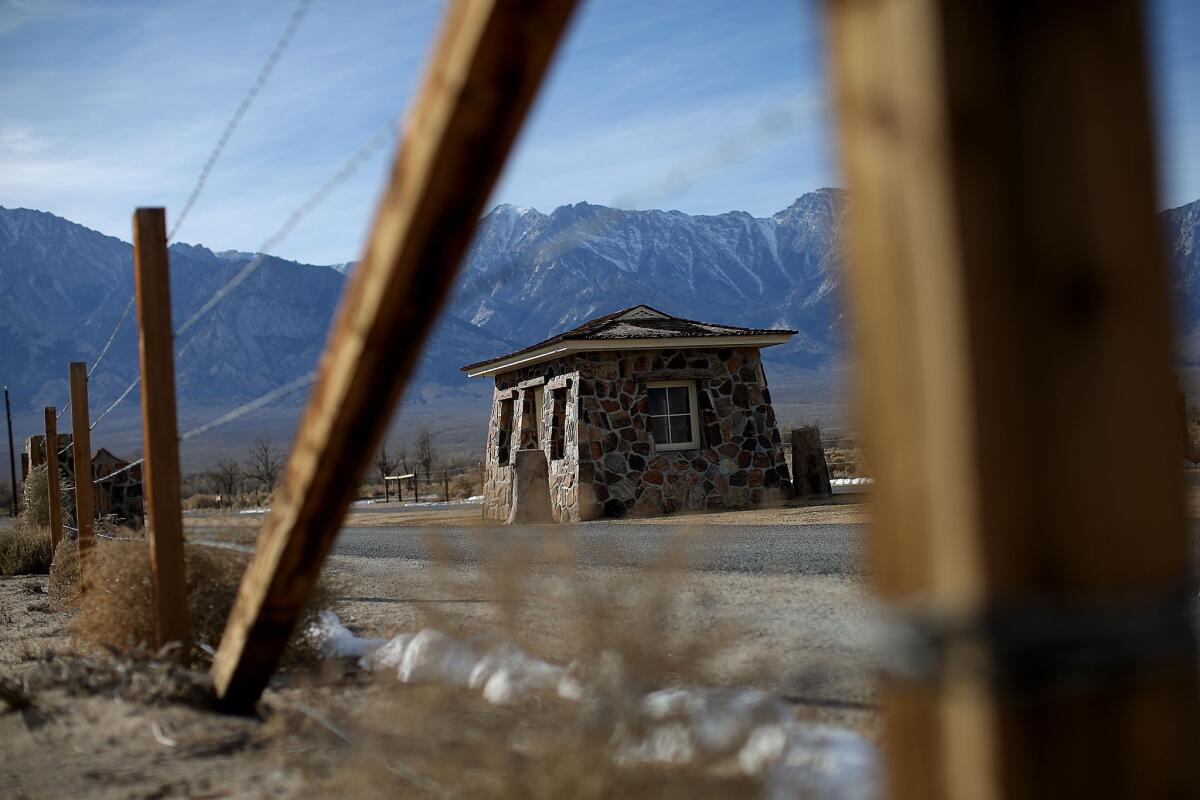Readers React: Japanese internment revisionists don’t appreciate how miserable and deadly the camps were

- Share via
To the editor: Donald Trump has said he isn’t sure if he would send Muslims to internment camps, the implication being that he might. Lost in the discussion over his remarks is just what that experience was like for those who were in the camps during World War II. (“Trump’s rhetoric on Muslims echoes WWII hysteria over Japanese Americans,” Dec. 10)
I am lucky to know someone — my mother-in-law — who was in one of those camps. The internment project began with a freezing of bank accounts, a restriction on travel and a curfew for Japanese Americans. Many families were as a consequence ruined financially.
Families were broken apart, and many were not reunited for years. The internment spared no one — infants and the infirm were carted off to remote and barely habitable barracks along with everyone else. The camps themselves were located in our harshest wastelands. It is not hard to imagine the fate of the most vulnerable who ended up confronted with extremes of heat, cold and the constant dust storms that plagued many of the camps; some internees took their own lives. Overzealous guards shot prisoners; most notably, a dozen men were shot at Manzanar in December 1942.
At 86, my mother-in-law’s health is failing, and she is no longer able to tell stories of her internment. Before long, this amazing woman will be gone and, one day, so will the entirety of her generation. I believe it’s important that those of us familiar with the history of the camps speak out, as it is all too easy for opportunistic politicians to disregard the facts while they stoke a fearful populace — just as they did 73 years ago.
Robert Hanson, Burbank
..
To the editor: An old car safety commercial showing a police officer walking amid wreckage ends with “This one was right — dead right.”
According to George Skelton, we should be politically correct, even though we could end up like the folks in Paris and San Bernardino. It does not take a genius to look at the past to determine what might have been done differently, but what suggestions does he have to protect us now?
As a young boy during World War II, I remember the blackouts and our neighbor standing on our corner wearing his military helmet during the air raid warnings. We lived just west of the 20th Century Fox studios in Rancho Park, and there was great concern that the soundstages might be mistaken for a military installation.
At the time no one knew what might happen, but nearly 75 years later Skelton assures us that we overreacted. Amazing.
Ed Freeman, Moorpark
..
To the editor: Skelton’s historical comparison of Trump and the internment of Japanese Americans illustrates the adage of those not knowing the past being doomed to repeat it.
Our schools need more emphasis on civics, history and the social sciences, including the Constitution and the Bill of Rights. While Skelton’s essay might be used in countless classrooms in the weeks ahead, we need more than episodic forays into social studies.
Schools need to emphasize, from elementary grades to college, who we are as a nation and a people as much as they test students in math and English. After all, we know too many students drop out or turn off before they even reach the engaging high school courses that cover civics and World War II.
David Tokofsky, Los Angeles
The writer was a member of the Los Angeles Unified School District Board of Education for 12 years.
Follow the Opinion section on Twitter @latimesopinion and Facebook
More to Read
A cure for the common opinion
Get thought-provoking perspectives with our weekly newsletter.
You may occasionally receive promotional content from the Los Angeles Times.









